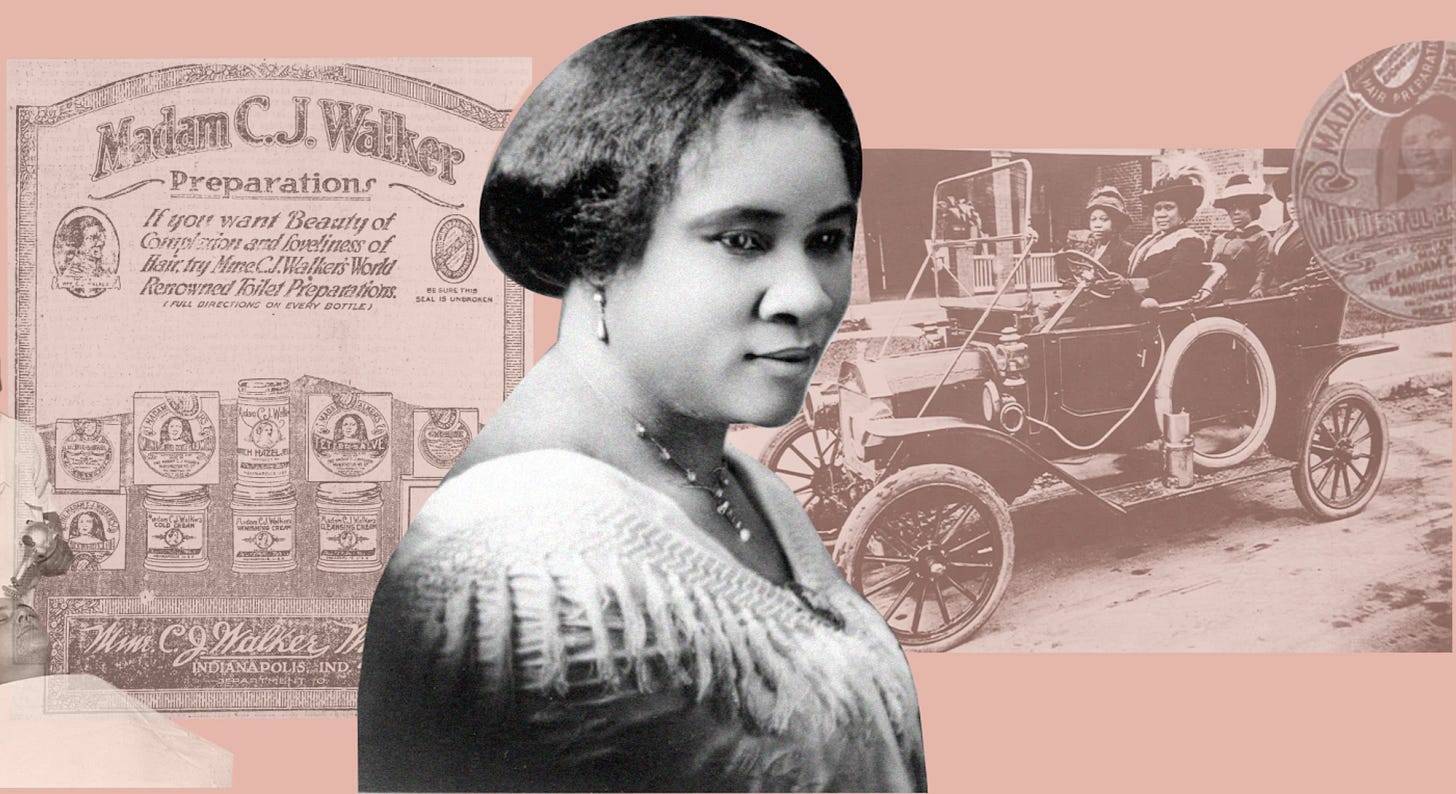Madam C.J. Walker’s Trailblazing Tale of Two Cities
1989 was the year I relocated to Indianapolis, Indiana (from my birthplace of Columbus, Ohio), having just accepted a leadership position at a small, rural hospital just southeast of the city. It was also when I first discovered the Circle City legacy of Madam C.J. Walker, widely considered to be the first self-made millionaire in America.
Born Sarah Breedlove in December of 1867 on a Delta, Louisiana plantation — the daughter of emancipated slaves turned sharecroppers Owen and Minerva Anderson Breedlove — she was orphaned at age seven, married by age fourteen, a mother by age eighteen and divorced by age twenty. In 1887, upon the passing of her first husband, Sara relocated to St. Louis with her four brothers.
Upon settling there, Breedlove began working as a laundress and cook. Struggling financially with the hard, stressful labor having taken its toll on her body, she began losing her hair. This led her to a hair-care product called "The Great Wonderful Hair Grower,” the brainchild of iconic Black entrepreneur Annie Turbo Malone.
Impressed with the results on her own scalp, Breedlove joined Malone’s team of Black female sales agents. This experience gave her a new found confidence and desire to pursue a better life for herself.
A “Mile High” Move
In 1905, Breedlove moved to Denver, Colorado, the city where I currently reside, with only $1.25 to her name. Having married advertiser Charles Joseph (C.J.) Walker (which led to her name change to Madam C.J. Walker) she decided to break away from Malone’s company and launch her own brand of hair care products called “Madam Walker’s Wonderful Hair Grower.
According to A’Lelia Bundles, Walker’s great-great granddaughter, biographer, and author of the book “On Her Ground: The Life and Times of Madam C.J. Walker,” Denver was the city where she first began to soar in her business. Reflecting on Walker’s sojourn to Denver, Bundles shared this in the book:
“When she (Madam C.J. Walker) reached Denver the next day on July 20, 1905, temperatures lingered in the pleasant mid-seventies, an agreeable relief from the stifling mid-nineties of her final week in St. Louis. Outside of Union Depot, the eastern edge of the snow capped Rocky Mountains resembled a napping Gulliver sprawled lazily along the skyline. No World’s Fair tourist brochures or moving pictures could have prepared Sarah for the vastness of the view. Always having lived in the embrace of Mississippi river humidity, she was unaccustomed to the West’ crisp dry air. Despite its acrid ore smelters, Denver's sun-sprayed skies were pristine compared with St. Louis’s sun-blocking murkiness.”
It was in Denver that Walker began building her empire by hiring and training women to sell beauty products door to door. This number grew into the thousands as she began selling her product throughout the U.S. as well as in the Caribbean and Central America.
Bundles from her book adds:
“Her door to door solicitations were made all the easier because of the compactness of Denver's black community. Around 1904, African-Americans had begun to spread north and east of the downtown neighborhood between 15th and 20th streets, where they had settled in the 1880s and 1890s. But their shift was less than seismic during the next decade as they migrated a block at a time toward the Five Points area that emanated from Twenty-seventh and Washington Streets, a mere half mile away.”
Denver’s Five Points District, a vibrant 20th century Black business and entertainment district which I chronicled in a feature story for Libertarianism.org became the epicenter of Malone’s new fortune.
As noted in Bundles book:
“Nineteenth and Arapahoe streets formed a crossroads for the several dozen black businesses, professional offices and meeting halls that spread out to Larimer Street on the north and Champa Street on the south.”
In two short years, Walker's wealth rivaled that of many American corporate executives at that time. In 1907, during her first full year on the road, she brought in $3652 (in today’s dollars worth $116,879.54)
Soaring Fortunes In Indianapolis
1910 was the year that Madam C.J. Walker decided to set up a laboratory and beauty school in Indianapolis. Her business flourished there despite the racial tension and discrimination that existed throughout Indiana and the rest of the nation.
According to David Leander Williams in his book African-Americans In Indianapolis:
“For decades, Indiana Avenue patrons frequented modestly appointed enter- tainment establishments like the Hortense, Pioneer, and Famous Theaters, 513 Indiana Avenue, the Washington Theatre, 521 Indiana Avenue, and the Hill’s Indiana Theatre, 412 Indiana Avenue. Patrons took for granted their Spartan ac- commodations and did not have a choice because many downtown Indianapolis theaters were racially segregated. Along came Madam C. J. Walker, and things changed drastically.”
Madam Walker died from complications of high blood pressure on May 25, 1919 at the age of 51 at her Irvington-on-Hudson, New York estate, Villa Lewaro. At the time of her death, it was estimated that her estate was worth $1 to $2 million.
While Denver and Indianapolis cannot lay claim to Walker as a native, the historical impact she’s had on both cities has been significant. This is particularly true in Indianapolis where the only early 20th century structure that remains in the 600 block of Indiana Avenue, the Walker Building, stands as a symbol to Madam CJ Walker’s trailblazing achievements as a Black entrepreneur. The building is on the National Register of Historic Places and is a National Historic Landmark.
Black Books, Black Minds” is a key foundation of my Great Books, Great Minds” passion project. For me, it’s a labor of love fueled by the endless hours of work I put into researching and writing these feature articles. My aim is to ignite a new world of community, connection, and belongingness through the rich trove of Black History books, thought leaders, and authors we unearth.
So if you are enjoying this digital newsletter, find it valuable, and savor world-class book experience featuring non-fiction authors and book evangelists on Black History themes, then please consider becoming a paid member supporter at $6.00/month or $60.00/year. Large or small, every little bit counts.”





